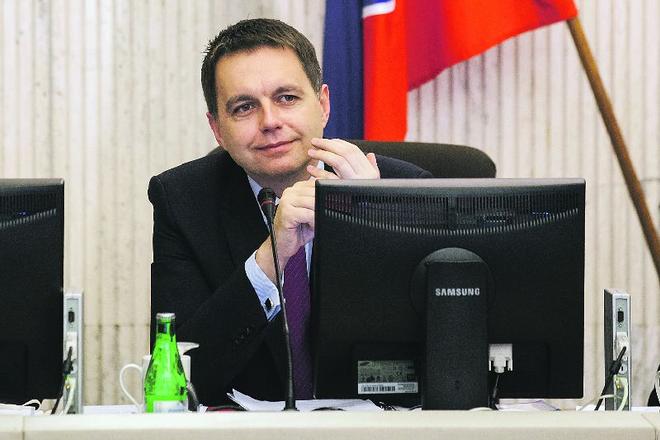THE MINISTRY of Finance has not had much good news to share with Slovakia’s public so far this year: first it whittled its forecast for the country’s economic growth down to 1.2 percent and then, on February 8, it said that this year the state would collect €361 million less in taxes than it had assumed in the budget for 2013. While Finance Minister Peter Kažimír blamed gloomier economic prospects for the lowered estimate for tax collection, the opposition attributed it to changes that the government of Robert Fico has made to tax and payroll tax legislation.
“The main reason for the negative revision of revenues is mainly the worsening outlook for macroeconomic development,” read an official report from the Financial Policy Institute (IFP), part of the Ministry of Finance.
In late January Kažimír’s department explained the lowered GDP growth forecast, 0.9 percentage points down from its September estimate, by suggesting that the “debt crisis in the eurozone over the past months has unfavourably impacted the economies of our main trading partners and increasingly concerns Slovakia”.
Nevertheless, the ministry said that despite the gloomier outlook it was still sticking to the target of pushing the public finance deficit under 3 percent.
“I am certain that we will master this twist,” said Kažimír, as quoted by the SITA newswire, while conceding that it did represent a complication.
Among those macroeconomic factors, the expected worsening of the labour market, which reflects unfavourably on direct tax collection, has had the strongest impact on the revenue prediction, the IFP said in its report. Economic uncertainty and the related lower confidence of consumers will result in slower growth in household consumption, which will negatively impact value added tax and excise tax revenues. The slowing economy will, at the same time, affect the profitability of firms and thus negatively influence the collection of income taxes, according to the IFP.
Despite this, the ministry hopes to cover the shortfall first of all from funds the state will receive from savers who recently chose to leave the second, capitalisation pillar of the pension scheme. It is still not clear how much money the state will collect in this way, but Kažimír estimated that the sum may reach €250 million, the TASR newswire reported.
The remaining shortfall of around €100 million will be bridged by limiting state expenditures on individual items (instead of whole areas) and with higher income from state-run firms.
“It seems that in some cases revenue from dividends could be better and I guarantee that we will sweep all the corners,” said Kažimír, as quoted by SITA.
Opposition blames tax changes
The government is eliminating self-employment through high payroll taxes and liquidating jobs by a ‘Cuban labour code’, while imposing excessive taxes on businesses compared to neighbouring countries, said Milan Moravčík of the Christian Democratic Movement (KDH) at a press conference organised by the People’s Platform, an opposition grouping which includes the Slovak Democratic and Christian Union (SDKÚ) and Most-Híd as well as the KDH.
Most-Híd MP Ivan Švejna said that since many of the measures taken by Smer came into effect only on January 1, some of the negative impacts are yet to come, SITA reported
“Obviously, this prognosis will not work out either,” Švejna said, adding that Slovakia’s obligation to push the deficit under the Maastricht criteria is only in what he called in “the theoretical domain”.
The collection
Last year, the government was forced to revise its estimate for tax collection downward several times. Kažimír blamed the revisions first of all on the collapse of the Financial Administration’s information system in early 2012, when it failed to pay back to entrepreneurs their value added tax (VAT) overpayments.
Because VAT refunds paid out during the first quarter of 2012 should have been deducted from state income for 2011, but that did not happen, state income in 2011 was “optically” increased and then decreased in 2012.
As a result, not only was VAT income for 2011 overstated by €180 million but the incorrect figures also skewed the estimates for 2012, according to Kažimír.
Last year, the tax revenues of the state came to €8.464 billion, down 2.7 percent compared to 2011. Non-tax revenues of the state for 2012 stood at €269.2 million, making a total of €8.733 billion, SITA reported.



 Finance Minister Peter Kažimír (source: SITA)
Finance Minister Peter Kažimír (source: SITA)